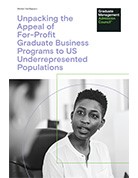A new GMAC Research white paper examines the URP recruitment success of for-profit programs and makes recommendations to nonprofit programs seeking to improve their applicant pool diversity.

An area of graduate management education (GME) that has excelled at attracting underrepresented populations (URPs) is the for-profit sector, including programs at nationally known brands like the University of Phoenix, Strayer University, and Capella University. In total, URP students accounted for half of for-profit GME degrees conferred in 2015-2016, the last year of available data. This stands in stark contrast to nonprofit GME, where URP graduates accounted for just 23 percent of degrees conferred.

What accounts for the success in diversity recruitment among for-profit programs? What aspects of for-profit GME appeal most to URP candidates? What can nonprofit programs learn from for profit success as they seek to diversify their applicant pools? These are among the important questions explored in a new GMAC Research white paper published on gmac.com this week, titled Unpacking the Appeal of For-Profit Graduate Business
Programs to US Underrepresented Populations.
Based on a research study carried out in partnership with marketing strategy firm globalsojourn, the white paper details how for-profit GME programs are enrolling potentially high-quality URP candidates that could be competitive applicants at nonprofit programs based on their educational and professional backgrounds. Through their marketing and recruitment strategies, for-profit GME institutions very effectively position their programs in a way that maximizes their appeal to URP candidates, and, through a fine tuned engagement process oriented toward “closing,” for-profit representatives deftly assuaged prospects’ concerns and quickly convert them to students.
Perhaps in part due to the efficacy of their marketing and engagement practices, respondents perceive for-profit GME programs as superior to nonprofit programs in the areas for profits highlight not in their program positioning: program flexibility, a quality education to boost their career from instructor with relevant experience, and an easy application and admissions process. Respondents largely view the overall quality and costs of for-profit programs as at parity with nonprofit programs, and across the various attributes explored in this study, there were no aspects in which respondents perceive nonprofit programs to be superior to for-profit programs. Excluding the most prestigious, household name brands among nonprofit GME programs, for-profit URP candidates do not differentiate between nonprofit and for-profit programs from a quality and brand perspective.
Among the recommendations to nonprofit programs outlined in the paper is to focus on more effectively recruiting and converting URP nonprofit bachelor’s degree earners. The study findings suggest these individuals are those that nonprofit GME programs would have the best chance at “stealing away” from for profits, as they view for-profit GME programs less favorably, and are less likely to evaluate for-profit GME options and enroll as a for-profit GME student. Another recommendation is consider providing—and effectively marketing—career assistance aimed at URP candidates’ expected professional outcomes, which the study reveals are most often short-term and pragmatic. In addition to long-term career building, providing and marketing career assistance aimed at short-term career progression opportunities and practical advice on topics like networking, navigating company politics, negotiating salary increases, and succeeding as a person of color in the workplace would likely resonate with this population.
For more of the study findings and recommendations for nonprofit programs, download the full white paper at gmac.com/whitepapers. Printed copies will be available this week at GMAC Annual Conference in Boston, MA.


